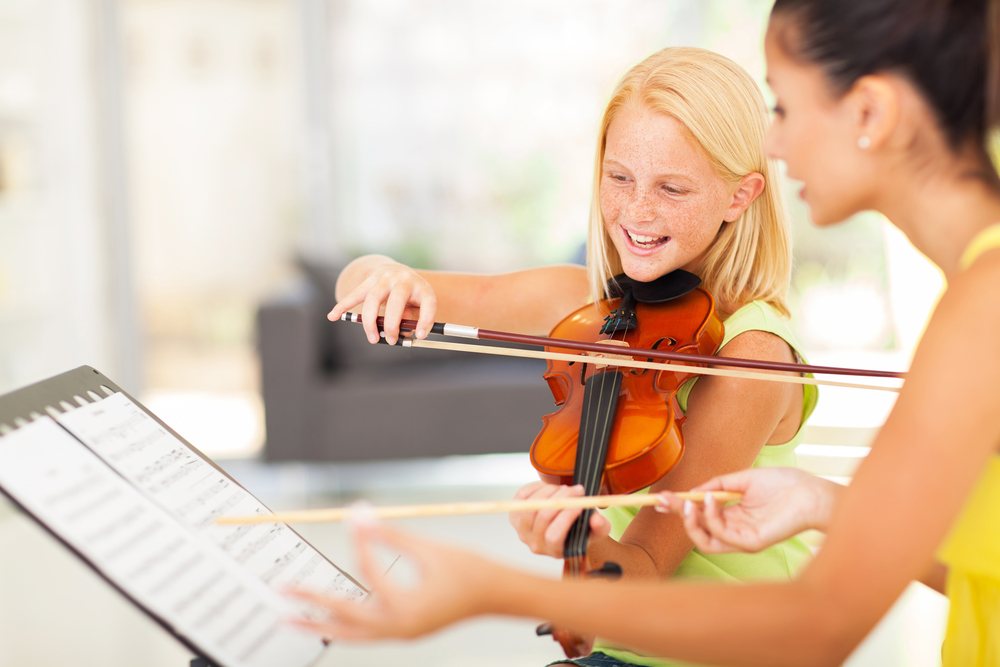
Navigating the world can sometimes be a challenging journey for children with learning differences. But here’s a heartwarming note: the benefits of music for special needs students are transformative. Not only does music act as a soothing balm, but it also provides them with a powerful tool to understand themselves, communicate more effectively, and form meaningful connections with those around them. And it’s not just about feeling the rhythm or humming a tune; music lessons stimulate various parts of the brain, making the entire experience a symphony of multi-sensory engagement. Let’s dive into this harmonious world and explore why music lessons can be a game-changer.
Music Lessons Enhance Cognitive Skills and Learning Abilities
The harmonious realm of music, with its complex melodies and rhythms, serves as a fascinating cognitive playground for children with learning differences. When these young minds are immersed in music lessons, there’s an upswing in their academic performance. Memory, attention, and problem-solving – core cognitive domains – witness marked enhancements, painting a brighter academic future for them.
Taking a leaf out of real life, consider the journey of a child with intellectual disabilities. For them, the rhythm and beats aren’t just sounds; they’re therapeutic companions. Especially when they’re striking the keys of a piano or the surface of drums, it’s not just about making music. It’s about anchoring their minds, honing their attention, and giving them a medium to express, especially true for nonverbal children or those with language challenges. And for our spirited kids with ADD or ADHD, zoning into the musical details of a song can be their golden ticket to an elongated attention span. It’s truly a testament to how music can be both a refuge and a cognitive stimulant for children with special needs.
Music Lessons Nurture Children’s Emotions and Social Skills
The beautiful world of music isn’t just a tapestry of notes and rhythms; it’s an arena where children can explore, express, and evolve emotionally and socially. Music provides an invaluable bridge for children with learning differences to convey their deepest emotions, which sometimes words can’t capture. Picture a child who struggles with verbal communication. When they’re handed a musical instrument, suddenly they find their voice, pouring out emotions, frustrations, joys, and fears through each note played.
Moreover, music fosters connection. Children often bond over shared musical experiences, whether it’s playing a duet or being part of a choir. This shared experience is essential for kids with special needs as it cultivates empathy and understanding among their peers. Just like playing in a band requires synchrony, music in many ways nurtures the art of listening and connecting.
Music Lessons Create a Harmonious Sensory Experience
For children with learning differences, the world can sometimes feel overwhelming, buzzing with an array of sensory inputs. Here’s where music becomes their sanctuary. Music, with its structured melodies and rhythms, offers a predictable and calming sensory experience. Children can anticipate a song’s progression, providing them with a sense of control.
The rhythmic nature of music can serve as a regulator for children, especially those struggling with sensory processing. Think of a child with hypersensitivity to touch or sound; introducing them to soft, rhythmic tunes can gradually acclimate their sensory system, reducing anxiety. This form of sensory integration through music makes it easier for them to engage with the world around them. Plus, for many, the act of listening to playing music becomes a haven—a structured, calming environment amidst the chaos.
Music Lessons Support Speech and Language Development
Music lessons serve as a powerful tool to support speech and language development for special needs students. Let’s delve into rhythm, for instance. The rhythmic patterns in music mirror the cadence and intonation of our speech. By practicing these patterns, children can better grasp the rhythm of sentences, aiding in both comprehension and expression.
Melody, too, plays its part. The highs and lows of a tune can be likened to the intonations in our speech, teaching kids the essence of expression. And then there are the lyrics—what better way to enhance vocabulary and sentence structure? Singing along to songs not only enriches their word bank but also reinforces sentence formation and phrasing. So, the next time a child with learning differences belts out a tune or taps to a beat, know that they’re not just enjoying the music; they’re bolstering their speech and language development, one note at a time.
Music Lessons Promote Physical Coordination and Motor Skills
Music lessons offer a unique avenue for promoting physical coordination and motor skill development. With special needs students particularly, rhythmic and melodic elements have a remarkable impact on enhancing various aspects of physicality. For instance, drumming engages the hands and arms in precise movements, aiding in fine motor skill refinement. Dancing to music involves the whole body, encouraging movement, balance, and coordination. Even playing instruments like the piano or guitar requires finger dexterity and hand-eye coordination.
Music’s inherent structure provides a natural rhythm that helps children with learning differences establish a sense of timing, leading to improved overall physical coordination. Furthermore, music fosters body awareness as children respond to auditory cues, translating them into purposeful movements.
Enrich Your Child’s Journey with Music Therapy for Kids
Incorporating music into the lives of children, especially those with unique needs, holds immense significance in fostering holistic development. Music provides an engaging means for children to communicate, learn, and thrive. Lessons in Your Home understands the profound impact music can have on these children’s lives and is dedicated to bringing the joy of music into their journeys through exceptional music lessons.
Lessons in Your Home stands out as the optimal choice for music lessons due to our experienced music teachers specializing in special needs teaching. Our personalized approach ensures that each child’s unique requirements are met. From vocal training to instruments like piano and violin, we offer diverse music lessons to cater to various interests and aptitudes.
Experience the transformative power of music through Lessons in Your Home. Contact us today and embark on a musical journey that will make a lasting impact.
